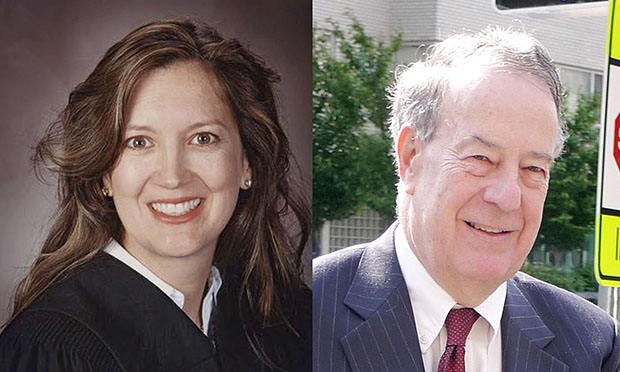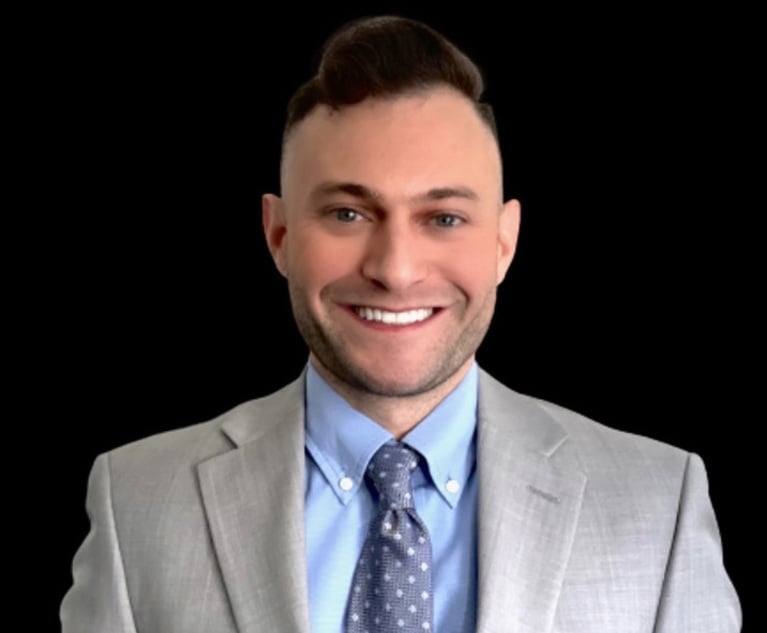Federal Circuit Makes It Official on PTAB Appointments
Over the dissents of four judges, the appellate court declined to make any changes to Arthrex v. Smith & Nephew. The decision leaves administrative patent judges with less job protection, and makes up to 81 cases eligible for new hearings.
March 23, 2020 at 07:15 PM
5 minute read
 Kimberly Moore, left, and Timothy Dyk, right.
Kimberly Moore, left, and Timothy Dyk, right.The U.S. Court of Appeals for the Federal Circuit is sticking with its Arthrex decision on the appointment on administrative patent judges.
Over the dissent of four of the court's 12 active judges, the court declined to reconsider its Oct. 31 decision that the 275 APJs who populate the Patent Trial and Appeal Board had been unconstitutionally appointed. At the same time, that decision retroactively made the appointments constitutional by interpreting the patent laws to give the U.S. Patent and Trademark Office director more power to fire APJs whose decisions he disagrees with.
The upshot is that—absent congressional or Supreme Court intervention—up to 81 America Invents Act proceedings that were decided by the PTAB last year will qualify for new hearings before a different panel of PTAB judges. And despite a 2018 Supreme Court decision tightening appointment standards in the executive branch, the jobs of PTAB judges are safe for now, though they might have to think twice before issuing decisions that could land them in PTO Director Andrei Iancu's doghouse.
"Rehearing this case en banc would have unraveled an effective cure and created additional disruption by increasing the potential number of cases that would require reconsideration on remand," Judge Kimberly Moore of the U.S. Court of Appeals for the Federal Circuit wrote in a concurrence to the denial of en banc review in Arthrex v. Smith & Nephew.
Moore is the author of the Arthrex panel decision. The goal of the decision, as guided by the Supreme Court precedents, is to establish more political accountability for administrative judges. The PTAB judges preside over patent validity trials pursuant to the America Invents Act and hear appeals from rejected patent applicants. They are classified as inferior officers and are therefore appointed by the secretary of commerce. Moore wrote last fall that because of the power and autonomy they enjoy, they are principal officers who must be appointed by the president and confirmed by the Senate.
But rather than invalidate all 275 appointments, Moore wrote that going forward, the Federal Circuit could read out a portion of the Patent Act that provides civil service protections to the judges. That would render them inferior officers.
Four judges who've written or joined panel decisions critiquing Arthrex contributed to dissents from denial of en banc review Monday.
Judge Timothy Dyk of the U.S. Court of Appeals for the Federal Circuit described removing the APJs' civil service protections as "a draconian remedy" that should not be invoked without giving Congress and the PTO a chance to develop something less disruptive. For example, the PTO could constitute executive rehearing panels staffed by presidential appointees or other judges who are removable at will by the commerce secretary. "A rehearing panel consisting of the Director, the Deputy Director, and the Commissioner of Patents would itself comply with the Appointments Clause," Dyk wrote.
In any event, he argued, Moore's remedy of severing civil protections should apply prospectively only, meaning there's no need to rehear the 81 cases.
Judge Todd Hughes also dissented, saying the director has enough control over the APJs without removing civil service protections. "Even if APJs are properly considered principal officers, I have grave doubts about the remedy the Arthrex panel applied to fix their appointment," Hughes warned.
Judge Evan Wallach also contributed a brief dissent, noting the PTO director's authority includes assigning judges to panels. "The ability to select is the ability to direct," Wallach wrote.
Judges Pauline Newman and Wallach joined Dyk's dissent, while Hughes joined a portion of it. Wallach also joined Hughes' dissent.
Judges Kathleen O'Malley, Jimmie Reyna and Raymond Chen joined Moore's concurrence, with O'Malley contributing a brief concurrence that was joined by Reyna and Chen.
Chief Judge Sharon Prost and Judges Alan Lourie, Richard Taranto and Kara Stoll didn't join any of the opinions, but it appears that at least two of them voted against en banc review.
Each party—including Arthrex Inc., which wants the PTAB judges declared unconstitutionally appointed, period—and the PTO had asked the court for en banc review. Arthrex's team was led by Carlson, Gaskey & Olds partner Anthony Cho and Molo Lamken partner Jeffrey Lamken. Smith & Nephew Inc.'s team included Wolf, Greenfield & Sacks partner Charles Steenburg and Gibson, Dunn & Crutcher partner Mark Perry. The PTO was represented by Melissa Patterson of the DOJ Civil Division's appellate staff and by members of the PTO solicitor's office.
Ropes & Gray partner Matthew Rizzolo, who's not involved in the case, said the outcome wasn't surprising, given that Federal Circuit panels have been routinely remanding cases to the PTAB for new hearings since the Arthrex panel decision. He said petitions for certiorari from both sides seem likely.
"This is a situation where the U.S. Supreme Court may be more apt to grant cert than in a typical patent matter—as it involves a constitutional issue (the Appointments Clause), the striking down of a portion of a federal statute, and a divided en banc appellate court," he said via email. "In addition to that, the case involves an issue—the distinction between 'principal' and 'inferior' officers under the Appointments Clause—that impacts administrative law more broadly."
This content has been archived. It is available through our partners, LexisNexis® and Bloomberg Law.
To view this content, please continue to their sites.
Not a Lexis Subscriber?
Subscribe Now
Not a Bloomberg Law Subscriber?
Subscribe Now
NOT FOR REPRINT
© 2025 ALM Global, LLC, All Rights Reserved. Request academic re-use from www.copyright.com. All other uses, submit a request to [email protected]. For more information visit Asset & Logo Licensing.
You Might Like
View All
'Religious Discrimination'?: 4th Circuit Revives Challenge to Employer Vaccine Mandate
2 minute read
'Pull Back the Curtain': Ex-NFL Players Seek Discovery in Lawsuit Over League's Disability Plan


Fatal Shooting of CEO Sets Off Scramble to Reassess Executive Security
5 minute readLaw Firms Mentioned
Trending Stories
- 1Settlement Allows Spouses of U.S. Citizens to Reopen Removal Proceedings
- 2CFPB Resolves Flurry of Enforcement Actions in Biden's Final Week
- 3Judge Orders SoCal Edison to Preserve Evidence Relating to Los Angeles Wildfires
- 4Legal Community Luminaries Honored at New York State Bar Association’s Annual Meeting
- 5The Week in Data Jan. 21: A Look at Legal Industry Trends by the Numbers
Who Got The Work
J. Brugh Lower of Gibbons has entered an appearance for industrial equipment supplier Devco Corporation in a pending trademark infringement lawsuit. The suit, accusing the defendant of selling knock-off Graco products, was filed Dec. 18 in New Jersey District Court by Rivkin Radler on behalf of Graco Inc. and Graco Minnesota. The case, assigned to U.S. District Judge Zahid N. Quraishi, is 3:24-cv-11294, Graco Inc. et al v. Devco Corporation.
Who Got The Work
Rebecca Maller-Stein and Kent A. Yalowitz of Arnold & Porter Kaye Scholer have entered their appearances for Hanaco Venture Capital and its executives, Lior Prosor and David Frankel, in a pending securities lawsuit. The action, filed on Dec. 24 in New York Southern District Court by Zell, Aron & Co. on behalf of Goldeneye Advisors, accuses the defendants of negligently and fraudulently managing the plaintiff's $1 million investment. The case, assigned to U.S. District Judge Vernon S. Broderick, is 1:24-cv-09918, Goldeneye Advisors, LLC v. Hanaco Venture Capital, Ltd. et al.
Who Got The Work
Attorneys from A&O Shearman has stepped in as defense counsel for Toronto-Dominion Bank and other defendants in a pending securities class action. The suit, filed Dec. 11 in New York Southern District Court by Bleichmar Fonti & Auld, accuses the defendants of concealing the bank's 'pervasive' deficiencies in regards to its compliance with the Bank Secrecy Act and the quality of its anti-money laundering controls. The case, assigned to U.S. District Judge Arun Subramanian, is 1:24-cv-09445, Gonzalez v. The Toronto-Dominion Bank et al.
Who Got The Work
Crown Castle International, a Pennsylvania company providing shared communications infrastructure, has turned to Luke D. Wolf of Gordon Rees Scully Mansukhani to fend off a pending breach-of-contract lawsuit. The court action, filed Nov. 25 in Michigan Eastern District Court by Hooper Hathaway PC on behalf of The Town Residences LLC, accuses Crown Castle of failing to transfer approximately $30,000 in utility payments from T-Mobile in breach of a roof-top lease and assignment agreement. The case, assigned to U.S. District Judge Susan K. Declercq, is 2:24-cv-13131, The Town Residences LLC v. T-Mobile US, Inc. et al.
Who Got The Work
Wilfred P. Coronato and Daniel M. Schwartz of McCarter & English have stepped in as defense counsel to Electrolux Home Products Inc. in a pending product liability lawsuit. The court action, filed Nov. 26 in New York Eastern District Court by Poulos Lopiccolo PC and Nagel Rice LLP on behalf of David Stern, alleges that the defendant's refrigerators’ drawers and shelving repeatedly break and fall apart within months after purchase. The case, assigned to U.S. District Judge Joan M. Azrack, is 2:24-cv-08204, Stern v. Electrolux Home Products, Inc.
Featured Firms
Law Offices of Gary Martin Hays & Associates, P.C.
(470) 294-1674
Law Offices of Mark E. Salomone
(857) 444-6468
Smith & Hassler
(713) 739-1250










